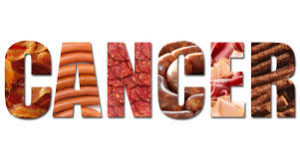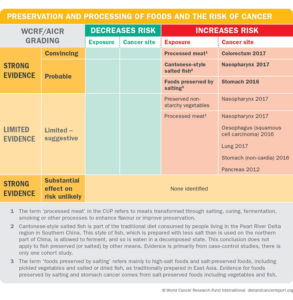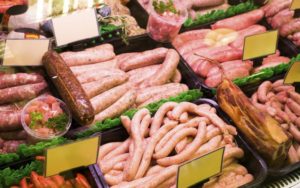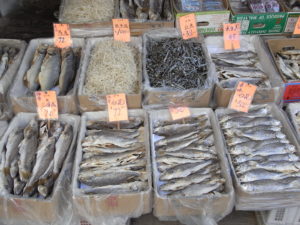
Following on from the previous blog which looked at how even the smallest consumption of alcohol is not safe, in terms of its ability to increase your risk of certain cancers, this blog looks at how the methods used in processing and preserving your food can also ramp up the nasty possibility that one day your doc will mention the ‘C’ word.
The Continuous Update Project (CUP), which analyses research on what causes cancer and how it can be prevented, operates under the auspices of the WCRF/AICR (World Cancer Research Fund/American Institute for Cancer Research). The following information is taken from their Third Expert Report 1 released in 2018.
The major findings of this Report are:
- there’s strong evidence that consuming:
- processed meat INCREASES the risk of colorectal cancer
- Cantonese-style salted fish INCREASES the risk of nasopharyngeal cancer
- foods preserved by salting INCREASES the risk of stomach cancer
- there’s limited evidence that consuming:
- preserved non-starchy vegetables INCREASES the risk of nasopharyngeal cancer
- processed meat INCREASES the risk of:
- nasopharyngeal cancer
- oesophageal cancer
- lung cancer
- stomach cancer (non-cardia 2 )
- pancreatic cancer
This information can be seen in the following chart.

Processing & Salting
The processing and preserving methods affect the chemical composition of foods as well as their nutritional value and carcinogenic potential.

Processed meats, as defined by the Report, are:
“meats (usually red meats) that have been preserved by salting, curing, fermentation, smoking, or other processes to enhance flavour or improve preservation.
Examples of processed meat include ham, salami, bacon, pastrami and some sausages. These include sausages, bratwursts, chorizo, frankfurters and ‘hot dogs’ to which nitrites or nitrates or other preservatives are added.”
Around the world, raw fish is widely preserved by salting and, depending on the precise conditions, salt-preserved fish may also undergo fermentation.

Cantonese-style salted fish uses less salt and a higher degree of fermentation than other methods of fish preservation. Some diets around the world still include significant quantities of salt-preserved foods, including salted meat, fish, vegetables and sometimes even fruit.
The World Health Organisation (WHO) recommends a daily maximum salt consumption of less than 5 grams (equal to less than 2 grams of sodium). 3 The Report advises that nobody should consume Cantonese-style salted fish.
Additionally, they say it’s best not to consume any foods that have been preserved by salting.
The possible mechanisms involved
Processed meat and colorectal cancer
It’s likely that a number of mechanisms are involved, including the following:
- similar to red meat, processed meat is rich in fat 4 , protein 5 and haem iron 6 , which can promote tumorigenesis (the process involved in the production of a new tumour or tumours)
- processed meats are often cooked at high temperatures, which can lead to increased exposure to heterocyclic amines 7 and polycyclic aromatic hydrocarbons 8
- processed meat is invariably higher in fat content than red meat, which may promote carcinogenesis through synthesis of secondary bile acids 9 ; however, the Report suggests that human data only offers weak support of this hypothesis at the moment, with more research being needed
- processed meat is also a source of exogenously derived N-nitroso compounds 10 11 , which may have carcinogenic potential.
Cantonese-style salted fish and nasopharyngeal cancer
Cantonese-style salted fish contains nitrosamines and nitrosamine precursors 12 . Some samples of Cantonese-style salted fish have been shown to have high levels of a nitrosamine called N-nitrosodimethylamine 13 and, in experimental models with animals, this has been found to found to induce cancer development.
Salt preservation and stomach cancer
There is good evidence that salt preservation can cause stomach cancer 14 . The following are suggested mechanisms:
- high salt levels can alter the viscosity of the mucous protecting the stomach and, hence, enhance the formation of N-nitroso compounds
- high salt intake may stimulate the colonisation of Helicobacter pylori (also known as H pylori, previously known as Campylobacter pylori, which is a gram-negative, microaerophilic bacterium usually found in the stomach) which is the strongest known risk factor for stomach cancer 15 16
- high salt levels have been shown to be responsible for the primary cellular damage which results in the promotion of stomach cancer development 17 18
There’s more information available 19 on the process by which cancer develops. You may also be interested in a blog I wrote about the fascinating subject, intimately related to cancer development, of angiogenesis and the work of Dr William Li 20 .
Final Recommendations of the Report
If you want to do all you can to avoid cancer, the Report recommends that: “[f]or people who eat meat, the recommendation is to eat little, if any, processed meat.”
Joe’s Comments
What stands out to me on the above chart is that there is nothing entered in the green column (i.e. evidence that these foods in any way decrease the risk of cancer. Isn’t this enough for any sensible person to conclude that such processed and salt-preserved foods should simply be removed from their diet – completely? Of course, we’re not all sensible people and even the sensible ones amongst us are not sensible all the time.
Of course sausage and bacon, salty and smoked fish taste wonderful and are so tempting – but I understand that injecting heroin is a wonderful (though transient) experience. Rushing out to buy some syringes?
Next blog
In the next blog we’ll take a quick look at the WCRF/AICR findings on how meat, fish and dairy consumption affects the risk of developing cancer.
References
- Preservation and processing
Preservation and processing of foods and the risk of cancer. WCRF/AICR Third Expert Report, 2018. [↩] - What’s the difference between cardia and non-cardia cancers? [↩]
- WHO issues new guidance on dietary salt and potassium [↩]
- What a Single Fatty Meal Can Do to Our Arteries. Written By Michael Greger M.D. FACLM on October 12th, 2017 [↩]
- The Problem with Protein [↩]
- Plant versus Animal Iron. Written By Michael Greger M.D. FACLM on June 15th, 2017 [↩]
- Heterocyclic Amines, nutritionfacts.org [↩]
- Wikipedia definition of polycyclic aromatic hydrocarbons [↩]
- World J Surg Oncol. 2014; 12: 164. Published online 2014 May 24. doi: 10.1186/1477-7819-12-164. PMCID: PMC4041630. PMID: 24884764. Secondary bile acids: an underrecognized cause of colon cancer. Hana Ajouz, Deborah Mukherji, and Ali Shamseddine. [↩]
- Cancer Epidemiol Biomarkers Prev. 2010 Jul; 19(7): 1709–1722. Published online 2010 Jun 22. doi: 10.1158/1055-9965.EPI-10-0225. PMCID: PMC2901412. NIHMSID: NIHMS206690. PMID: 20570910. Dietary Components Related to N-Nitroso Compound Formation: A Prospective Study of Adult Glioma. Robert Dubrow, Amy S. Darefsky, Yikyung Park, Susan T. Mayne, Steven C. Moore, Briseis Kilfoy, Amanda J. Cross, Rashmi Sinha, Albert R. Hollenbeck, Arthur Schatzkin, and Mary H. Ward. [↩]
- Endogenous versus exogenous exposure to N -nitroso compounds and gastric cancer risk in the European Prospective Investigation into Cancer and Nutrition (EPIC-EURGAST) study . Paula Jakszyn Sheila Bingham Guillem Pera Antonio Agudo Robert Luben Ailsa Welch Heiner Boeing Giuseppe del Giudice Domenico Palli Calogero Saieva Vittorio Krogh Carlotta Sacerdote Rosario Tumino Salvatore Panico Göran Berglund Henrik Simán Göran Hallmans María José Sanchez Nerea Larrañaga Aurelio Barricarte María Dolores Chirlaque José R. Quirós Timothy J. Key Naomi Allen Eiliv Lund Fátima Carneiro Jakob Linseisen Gabriele Nagel Kim Overvad Anne Tjonneland Anja Olsen H. Bas Bueno-de-Mesquita Marga O. Ocké Petra HM. Peeters Mattijs E. Numans Françoise Clavel-Chapelon Antonia Trichopoulou Claus Fenger Roger Stenling Pietro Ferrari Mazda Jenab Teresa Norat Elio Riboli Carlos A. Gonzalez
Carcinogenesis, Volume 27, Issue 7, 1 July 2006, Pages 1497–1501, https://doi.org/10.1093/carcin/bgl019 [↩] - Int J Cancer. 2000 Jun 1;86(5):603-9. Dietary exposure to nitrite and nitrosamines and risk of nasopharyngeal carcinoma in Taiwan. Ward MH, Pan WH, Cheng YJ, Li FH, Brinton LA, Chen CJ, Hsu MM, Chen IH, Levine PH, Yang CS, Hildesheim A. [↩]
- WHO: Concise International Chemical Assessment Document 38. N-NITROSODIMETHYLAMINE. First draft prepared by R.G. Liteplo and M.E. Meek, Health Canada, Ottawa [↩]
- World J Gastroenterol. 2009 May 14; 15(18): 2204–2213. Published online 2009 May 14. doi: 10.3748/wjg.15.2204. PMCID: PMC2682234. PMID: 19437559. Review of salt consumption and stomach cancer risk: Epidemiological and biological evidence. Xiao-Qin Wang, Paul D Terry, and Hong Yan [↩]
- Infect Immun. 2013 Jun; 81(6): 2258–2267. doi: 10.1128/IAI.01271-12. PMCID: PMC3676043. PMID: 23569116. High Dietary Salt Intake Exacerbates Helicobacter pylori-Induced Gastric Carcinogenesis. Jennifer A. Gaddy, Jana N. Radin, John T. Loh, Feng Zhang, M. Kay Washington, Richard M. Peek, Jr., Holly M. Scott Algood, and Timothy L. Cover. [↩]
- J Hypertens. 2004 Aug;22(8):1475-7. Salt intake and Helicobacter pylori infection. Beevers DG, Lip GY, Blann AD. [↩]
- Gastroenterol Res Pract. 2012; 2012: 808120. Published online 2012 Oct 22. doi: 10.1155/2012/808120. PMCID: PMC3485508. PMID: 23125851. Association between Habitual Dietary Salt Intake and Risk of Gastric Cancer: A Systematic Review of Observational Studies. Sheng Ge, Xiaohui Feng, Li Shen, Zhanying Wei, Qiankun Zhu, and Juan Sun. [↩]
- Salt and salted food intake and subsequent risk of gastric cancer among middle-aged Japanese men and women. S Tsugane, S Sasazuki, M Kobayashi & S Sasaki for the JPHC Study Group. British Journal of Cancer volume 90, pages 128–134 (12 January 2004). [↩]
- The cancer process. What is cancer and how does it develop? WCRF/AICR. [↩]
- Blood Vessels on the Menu [↩]